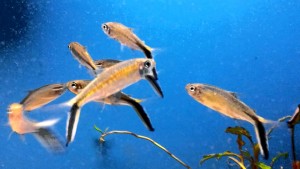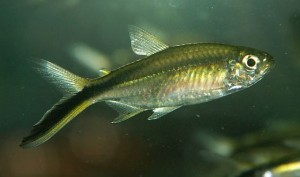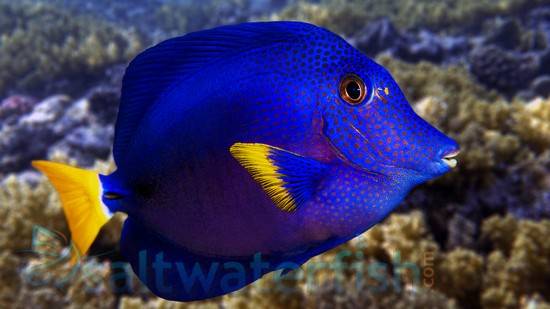The true Penguin Tetra (Thayeria obliqua) like it’s close relative Thayeria boehlkei, is found in the central sections of the Amazon and Rio Tocantins basins as well as the Rio Guapore, in Brazil. It inhabits the marginally vegetated black water jungle streams and tributaries and prefers the shady conditions encountered in these areas.
Although not as popular or common as the False Penguin Tetra (Thayeria boehlkei), they are also sold under the name “Penguin Fish“ and are frequently mixed together in shipments to tropical fish wholesalers.
The Penguin Tetra (Thayeria obliqua) has a pale silver to golden colored body with a black stripe that tapers upward from the lower lobe of the bottom half of the caudal fin and completely fades out before it reaches the dorsal fin in the fish. The dorsal and anal fins develop red tips as the fish grows and the caudal lobes are edged in an amber color. Like other species in the genus Thayeria, they swim in an obglique head up position.
Penguin Tetras are a peaceful schooling species that do best in larger groups of 10 or more individuals. They make an excellent addition to soft water community aquariums and are candidates for a jungle biotope style tank setup.
In a community aquarium, they need a densely planted dark sandy substrate with some river rock, a few small stones and driftwood roots. Indirect lighting or a few floating plants to provide shade should also be included in the tank setup.
Like their close cousins Thayeria boehlkei, these tetras are perfect candidates for a natural jungle blackwater biotope setting. Provide river sand as the substrate and add a few driftwood branches, a few hand fulls of dried catappa leaves
, and some peat to the aquarium filter to simulate the blackwater conditions.
Some tropical fish keeping enthusiasts add peat directly to the tank to simulate black water conditions. Initially the peat floats but will sink in a couple of days as it becomes waterlogged.
Although plants are not generally a prominent feature in the waters where true Penguin Tetras are found, they create a more effective display and add hiding places for the fish. A few low light growing plant plant species like Java Fern (Microsorum pteropus), Java Moss
(Taxiphyllum barbieri), Cryptocorynes, or Anubias can be added to the biotope tank.
To date there are no reports of successful captive breedings of true Penguin Tetras, however the strategy is probably similar to that of T. boehlkei breeding. All Penguin Tetra species will occasionally breed in an aquarium environment, but the fry are difficult to raise. The females can be distinguished from the males by their fuller and more rounded bodies.
Most tropical fish keeping enthusiasts use a breeding tank to preserve as many of the fry as possible. The tank should be very dimly lit and contain clumps of fine leaved plants such as java moss or several spawning mops to give the fish somewhere to deposit their eggs. Place the pair in the breeding tank until the eggs are laid. The eggs are light sensitive and will hatch approximately 12 to 15 hours after being deposited. The fry are very small and are also light sensitive but can be fed infusoria and newly hatched brine shrimp in the early stages of life. During this period, keep the tank in complete darkness or as dark as possible.
In their natural environment Penguin Tetras feed on zooplankton, worms, small insects, and crustaceans. In an aquarium environment they should be offered regular feedings of small live, frozen or freeze dried Daphnia, bloodworms, brine shrimp, tubifex, micro pellets, in addition to a high quality flake food.
Thayeria obliqua collected from the wild need soft acidic water, but most specimens seen in tropical fish shops are commercially farmed and can be kept in soft to moderately hard water with a neutral pH of 7.0 or less.
True Penguin Tetras are available for sale at a size of 3/4″ to 1-1/4″ in length.
Minimum Tank Size: 20 gallons
Care Level: Moderate
Temperament: Peaceful
Aquarium Hardiness: Moderately Hardy
Water Conditions: 72-82° F, KH 2-15, pH 6.0-7.0
Max. Size: 3.2″
Color Form: Iridescent Blue, Red
Diet: Omnivore
Compatibility: OK with other small tetras
Origin: South America, Amazon and Rio Tocantins basins
Family: Characidae
Lifespan: Up to 8 years
Aquarist Experience Level: Beginner to advanced




